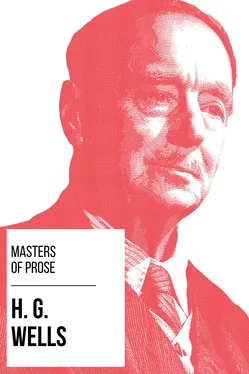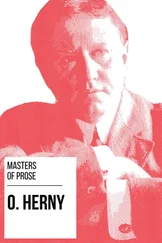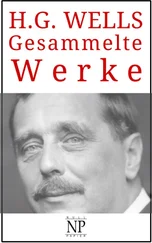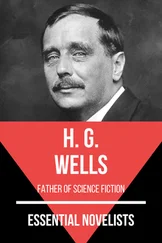Tono-Bungay (1909) touches only casually on the sex question. The involved love affairs of George Ponderevo are less essential than the career of his uncle, the inventor of the patent medicine that gives a title to the book. In many ways Tono-Bungay is the best novel that Mr Wells has given us. It is written in the first person, a narrative form that afterwards served to convey Mr Wells' interpolated criticisms of the bodies social and politic in something nearly approaching the shape of an essay, but in Tono-Bungay there are no important divagations from the development of the story. The framework of the book is provided by the life history of the narrator from early boyhood to middle age, matter interesting enough in itself even if it had not provided the means for revealing the inwardness of Edward Ponderevo's character and career. He was not a bad little man, this plump little chemist; a Lombroso or a Ferri would have found difficulty in classifying him as a "criminal type," however eager those investigators might have been to confirm their pet theories. Ponderevo's wife—the inimitable Aunt Susan—called him "Teddy" and his nephew endorses the appropriateness of that diminutive; he affirms that there was a characteristic "teddiness" about Uncle Ponderevo. He failed as a retail chemist in Wimblehurst. He was not naturally dishonest, but he had windy ideas about finance, and he was careless in the matter of certain trust monies. He was "imaginative, erratic, inconsistent, recklessly inexact," and his imagination led him by way of a patent medicine to company promoting on the Hooley scale. "Do you realise the madness of the world that sanctions such a thing?" asks Mr Wells in the person of the supposed narrator and points that question on a later page as follows:—"At the climax of his Boom, my uncle at the most sparing estimate must have possessed in substance and credit about two million pounds' worth of property to set off against his vague colossal liabilities, and from first to last he must have had a controlling influence in the direction of nearly thirty millions. This irrational muddle of a community in which we live gave him that, paid him at that rate for sitting in a room and scheming and telling it lies. For he created nothing, he invented nothing, he economised nothing. I cannot claim that a single one of the great businesses we organised added any real value to human life at all."
The enormous success and rapid failure of this futile, ambitious little chemist—a success that is, unhappily, only too conceivable and probable—are seen against the background of his nephew's life, Mr Wells has given a greater value and credulity to the legal criminalities of Ponderevo, by coming at him, as it were, through a wider angle; just as he achieves all the circumstances of reality in his romances by his postulation of an average eye-witness. But there are many threads in George Ponderevo's life that were not immediately intertwined with the Tono-Bungay career, and his love for Beatrice Normanby touches in quite another manner on the sex problem opened in Ann Veronica. In both these books the story is the essential thing, and the attack upon social conditions is relatively indirect. The general criticism is at times quite explicit, but it is subordinated.
In The New Machiavelli (1910) these relations are nearly reversed. The detailed exposure of the moving forces that stimulate our political energies, occupies long sections into which the human relations of Remington (the form is again that of an autobiography) hardly enter, except in an occasional conversation to sharpen up a criticism. This comment on politics (regarded in his own constituency, Remington says, not as a "great constructive process" but as a "kind of dog-fight") is the chief theme; subsidiary to it is the comment on a society that could waste so valuable a life as Remington's for the sake of a moral convention. Both comments point Mr Wells' expression of what he calls in this book "the essential antagonism ... in all human affairs ... between ideas and the established method—that is to say, between ideas and the rule of thumb." And he adds: "The world I hate is the rule-of-thumb world; the thing I and my kind exist for primarily is battle with that, to annoy it, disarrange it, reconstruct it." This confession is so lucid and characteristic that I cannot improve upon it, and yet I see that it is a statement likely to arouse considerable resentment, "Of course we are detestable," Remington admits in this connection; and in these later, more urgently critical novels, we recognise a little too clearly that note of protest, almost of defensive proclamation. And in none of them do we see it more definitely than in the book now under consideration. In many ways The New Machiavelli stands apart from the other novels. I find it a little bitter in places, because the thing condemned appears too small for such unequivocal condemnation. The following superlative summary is put into the mouth of a minor character, but I think it is fairly representative of Remington's later attitude. "But of all the damned things that ever were damned," says the plain-spoken Britten, "your damned shirking, temperate, sham-efficient, self-satisfied, respectable, make-believe, Fabian-spirited Young Liberal is the utterly damnedest." As a commentary, I find this exaggerated; and although it is in the mouth of one who is not presented as a spokesman for Mr Wells' own opinions, I feel that it comes very near to being a text for a considerable section of the political criticism; and that it indicates bias, a departure from normality.
And yet, despite this occasional exhibition of temper, The New Machiavelli is a most illuminating book. It reveals with extraordinary clearness the Wells of that period; but it also gives us a sight of the spirit in him that does not change. All his books, romances, novels and essays indicate a gradual process of growth; if we were to apply any label to him, we should inevitably land ourselves in confusion. He is nothing "in the first place" but a man with an intense desire to understand life. As he says in this book: "A human being who is a philosopher in the first place, a teacher in the first place, or a statesman in the first place, is thereby and inevitably—though he bring God-like gifts to the pretence—a quack." But while he may dissociate himself from any clique, and disclaim any fixed opinion that might earn for him the offensive and fiercely rejected label, he nevertheless presents to us one unchanging attitude in these very refusals. "I'm going to get experience for humanity out of all my talents—and bury nothing," says Remington; and that purpose is implicit in every book that Wells has written. He is an empiric, using first this test and then that to try the phenomena of life; publishing the detail of his experiment and noting certain deductions. But while he may offer a prescription for certain symptoms, he gives us to understand that he is only diagnosing a phase in human development; that he is seeking an ultimate which he never hopes to find, and that the deductions he draws to-day may be rejected to-morrow without a shadow of regret. He would be constant, I think, only in his inconstancy to any criterion of present conditions as applicable or likely to be applicable to the future; he sees life as a dynamic thing in process of change and growth. "All the history of mankind," he writes, "all the history of life has been and will be the story of something struggling out of the indiscriminated abyss, struggling to exist and prevail over and comprehend individual lives—an effect of insidious attraction, an idea of invincible appeal." And it is for this reason that he is so eager to battle with, annoy, disarrange and reconstruct that rule-of-thumb world he censures so steadily; he is fighting the assumption of a static condition which he knows to be impossible.
Читать дальше












